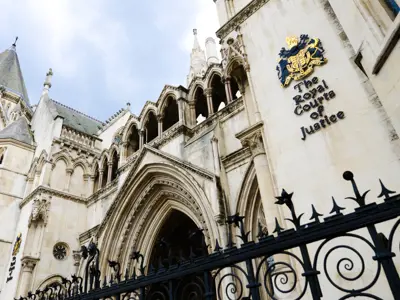
Friends of the Earth will appeal as judges divided over lawfulness of UK Government investment in Mozambique gas project
Two judges opened the way to an appeal when they were unable to agree on whether the UK Government’s decision to invest $1.15bn in a gas project in Northern Mozambique is unlawful.
Posted on 16 March 2022
In what is believed to be a first in constitutional law, the judges gave a split ruling following a judicial review in a case brought by Friends of the Earth (FoE).
Without a unanimous decision on the lawfulness of the finance package to the $20bn development by Total E&P, the challenge by FoE failed. However, the judges gave permission to appeal, which FoE intends to do.
In the judgment handed down on Tuesday 15 March, Lord Justice Stuart-Smith ruled that financing the project is compatible with the Paris Agreement.
But Mrs Justice Thornton concluded that UK Export Finance (UKEF) had erred in not making reasonable and legally adequate inquiries into the climate risks. Specifically, she said, UKEF had failed to quantify the greenhouse gas (GHG) emissions from the end-use of the gas. She found that there was no rational basis for UKEF’s assessment that the funding was consistent with the Paris Agreement and a low emissions pathway.
FoE had argued that the decision to provide the finance package – one of the biggest ever offered to a foreign fossil fuel project by the Department of Trade and Foreign Affairs – was unlawful, because the failure of UKEF to quantify the emissions that will be produced from the end-use of the liquid natural gas (LNG) made it incompatible with the Paris Agreement.
The project will extract 43 million tonnes of LNG per annum for 32 years from offshore gas fields in Cabo Delgado, and create 4.3 billion tonnes of combusted emissions.
The construction phase of the project will increase the GHG emissions of Mozambique by up to 10 per cent by 2022, say FoE, who estimate that the emissions from the end-use of the gas produced over the project’s lifetime could be equivalent to the combined annual emissions of all 27 EU member countries.
FoE argued that the UK’s obligations both globally, in terms of making all finance flows consistent with the low emissions pathway required in Article 2(1)(c) of the Paris Agreement, and at a country level, in terms of assisting Mozambique to meet its Nationally Determined Contribution (NDC), will not be adhered to as a result of the financing.
Importantly, in her dissenting judgment, Mrs Justice Thornton clarified that, in order to demonstrate compliance with Article 2(1)(c), the Government had to demonstrate that funding the project was consistent with a pathway towards limiting global warming to well below 2°C and pursuing efforts to 1.5°C, even though UKEF was afforded discretion in how it demonstrated compliance.
Lord Justice Stuart-Smith said UKEF was entitled to decide that, although it chose to include consideration of climate change impacts and the Paris Agreement alongside other factors in making its decision, it was not obliged to give them greater prominence or weight or to obtain further and more technical information than it did.
In an important step, the Divisional Court has given FoE permission to appeal to the Court of Appeal on the following grounds:
The Defendants failed in their duty of sufficient inquiry by (i) not quantifying the indirect downstream greenhouse gas emissions from the processing and use of the LNG generated by the Project and/or (ii) only carrying out a high-level, qualitative review of those emissions.
The Defendants were required to adopt a view of the Paris Agreement that was more than merely “tenable”.
There was no rational basis on which the Defendants could conclude that the decision to provide funding was compatible with Article 2(1)(c) of the Paris Agreement.
In doing so, the Divisional Court recognised that the grounds have “real prospects of success”, and the question of whether the legal test is that the UKEF only required a “tenable” view (of what was required by the Paris Agreement) additionally “raises a point of general importance which provides a compelling reason for an appeal to be heard”.
Will Rundle, head of legal at Friends of the Earth, said:
“Our claim that the Government’s export credit agency acted unlawfully has today been vindicated by a High Court judge, but UK Export Finance has been let off the hook on a technicality, for now. Our fight for climate justice means that an appeal is now inevitable, and we remain confident of success in light of the compelling findings clearly laid out by Justice Thornton.
“In the meantime, there are big questions for UKEF and for the Government on whether it can feasibly still support this project when a judge has plainly said that its funding cannot rationally be considered compliant with the law.
“This case has shown that making poor decisions at the expense of our planet’s future leaves the Government increasingly vulnerable to climate litigation.”
Leigh Day solicitor Rowan Smith, who represents Friends of the Earth, said:
“This judgment truly breaks new legal ground. Not only is it the first to consider whether UK financing of a fossil fuel project abroad, which will lead to a significant increase in carbon emissions, is compliant with the Paris Agreement. It is also novel in constitutional law terms, because the ruling of a Divisional Court – such as this one – has not been divided in this way before. Clearly, the Court was correct to grant permission to appeal for these issues to be determined by the Court of Appeal. Our client looks forward to another opportunity to explain why the Government acted unlawfully in failing to quantity the climate change impact of its decision.”




